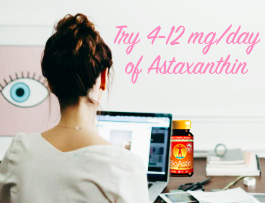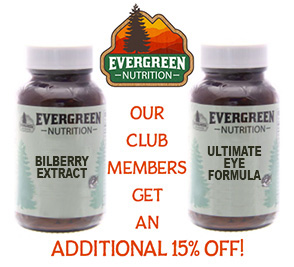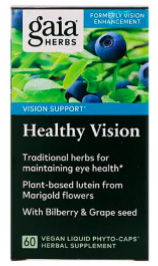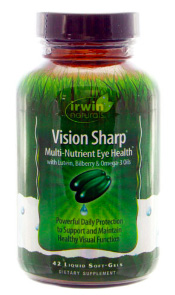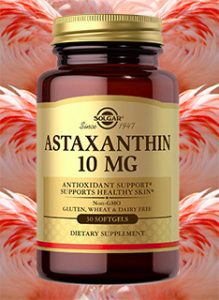Vision Support: Nutrients for Your Eyes
Vision Support: Nutrients for Your Eyes
There are many nutrients (vitamins, minerals, antioxidants), phytochemicals, and herbs that benefit the eyes. Most are well known by this time, such as lutein, for example. However, there are many nutrients for vision support which are not as commonly known but which nonetheless are important. In this newsletter we will look at some lesser-known substances for eye support.
Fatty Acids (LNA/DHA)
Alpha-linolenic acid (LNA) is the precursor fatty acid to DHA (docosahexaenoic acid). The human body converts LNA to DHA but this conversion is not always reliable due to certain factors, such as impaired liver function, aging, and more. The retina of the eye relies on these fatty acids, particularly DHA, for proper function. They concentrate in the cell membranes of the retina and may be involved in the conversion of light entering the eye into nerve impulses.
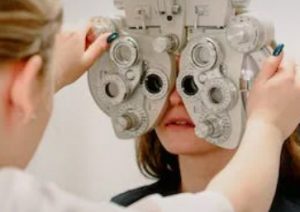
Tests with both animal and human subjects have found DHA supplementation to significantly improve visual acuity. This vital fatty acid is supplied by fish oil and also certain algae (vegan source). Studies have shown that after four weeks of LNA deficiency it may take up to ten times more light before the retina responds to it. This occurs as a result of insufficient LNA being available for conversion to DHA. The Age-Related Eye Diseases Study (AREDS) looked at over 4000 people between the ages of sixty to eighty years old and found that dietary omega three acid intake from fish and/or supplements was associated with a thirty-nine percent decrease in neovascular age-related macular degeneration (AMD), and that DHA supplementation was associated with a forty-six percent decrease. Also, increased consumption of the inflammatory omega-6 fatty acid arachidonic acid was associated with a fifty-four percent increased prevalence of AMD. This unhealthy fatty acid is found in oils such as corn, cottonseed, canola, and others used in overly refined, processed, packaged foods.
Flavonoids
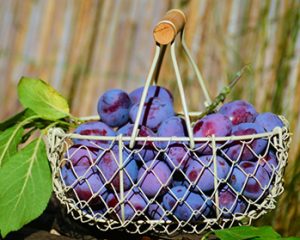
Some of the flavonoids supporting vision include the anthocyanins, proanthocyanidins, and oligo procyanidins (OPCs). These are all very closely related compounds and occur in red-blue berries and fruits such as blueberries, bilberries, hawthorn berries, cherries, grapes, and grape seeds. They are also found in substances as varied as green tea and cacao. These compounds offer multiple, powerful benefits to the eye. They can improve vision in different aspects and also protect against conditions such as AMD and glaucoma via their antioxidant activity, collagen stabilization, and vascular wall stabilization. We will look at some of these in depth.
Bilberry
Closely related to blueberries, this berry is famously known for supporting night vision, and was consumed by RAF pilots in WWII to assist with night-time bombing runs. Bilberry does more than just help to improve night vision. The anthocyanidin compounds in the dark purple berry prevent free radical damage and cross-link with collagen fibers to form a more stable collagen matrix. These actions may reduce near-sightedness. The flavonoids also reduce the accumulation of sorbitol in the lens which is a major risk factor for cataracts. In one human study, bilberry extract plus vitamin E stopped progression of cataract formation in 97% of 50 patients with cataracts. Bilberry has been shown as well to maintain the ability to see after exposure to glare.
Grape Seed Extract
The seeds of grapes contain compounds called oligo procyanidins (OPC), and are powerful antioxidants. Like their cousins, anthocyanins from dark berries, these compounds help maintain normal vision. They have been shown in studies to relieve eye strain and help with adaptation after glare exposure, as well as improving/maintaining night vision and vision in dim lighting. OPCs stabilize the collagen network and strengthen blood vessel walls for improved circulation.
Astaxanthin
This “king of the carotenoids” has so many applications for health support that one newsletter could not hope to cover them. Due to its powerful antioxidant activity astaxanthin has been shown to have profound protective qualities for the eye. Cataracts and AMD appear to be the result of a lifetime of light-induced oxidation. They are commonly related to aging. It is known that the consumption of certain carotenoids, specifically lutein and zeaxanthin, is related to a reduced risk for both of these conditions. These two carotenoids are preferentially deposited in the eye to protect from light-induced damage. Astaxanthin, while not normally found in the eye, has been shown to protect the eye from light-induced damage, photoreceptor cell damage, damage to nerve bundles, nerve damage, and inflammatory damage.
In addition, multiple studies have found astaxanthin to help ward off eye fatigue in people using computer screens for extended periods. One study in Japan showed that people logging a lot of computer time taking 5 mg per day for four weeks reported a 46 percent reduction in eyestrain and an increase in the ability of the lens to focus (resulting in less fatigue). Other studies using from 4-12 mg per day showed similar improvements to eye fatigue, as well as less eye soreness, less dryness, and less blurred vision. (To learn more about astaxanthin see our previous newsletter.)
Evergreen Nutrition’s vision-support section has multiple options for the supplements discussed here. Our own label offers Bilberry Extract, a high potency extract in a vegan capsule. Also from our own label comes Ultimate Eye Formula, combining a bilberry/blueberry extract with lutein for extra support. Gaia Herbs offers their Healthy Vision, a blend of bilberry and grape seed extracts with astaxanthin. Irwin Naturals’ Vision Sharp is an inspired blend of fish oil (supplying omega-3 fatty acid DHA), bilberry extract, and lutein/zeaxanthin. BioAstin’s Hawaiian Astaxanthin is a 4 mg softgel in a base of safflower oil for increased absorption. Solgar has their high potency 10 mg Astaxanthin.
Back to Blog
